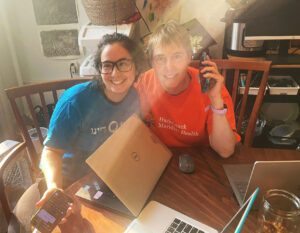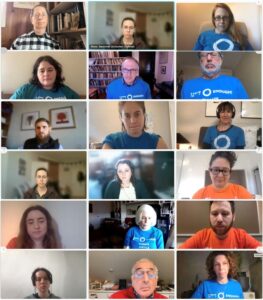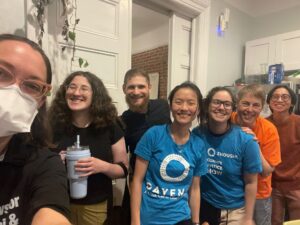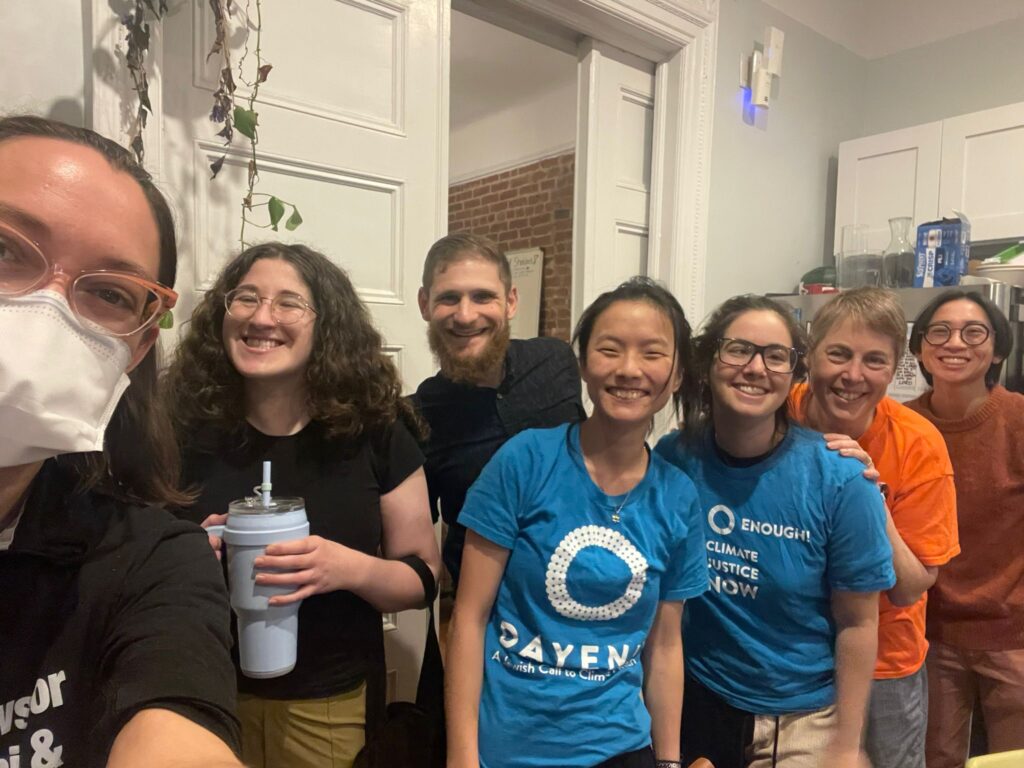Amalya Sherman, an art teacher at an elementary Jewish day school in Brooklyn, has been increasingly active with Dayenu this year – most recently advocating for the defeat of the Energy Permitting Reform Act (aka the Dirty Deal). She just joined 15 Dayenu activists at a meeting with staffers from Sen. Chuck Schumer’s office.
Dayenu: Can you tell us a bit about how it feels to take action with Dayenu, as a Jewish climate activist? What was your first real engagement?
Amalya: My first engagement was attending a Summit a few years back and then I reconnected this year during the Summer of Heat campaign. When I do faith-based organizing it feels like all the parts of me are aligned, it’s powerful. The Summer campaign included several faith-based actions in partnership with Dayenu. Participating in the faith actions were a highlight for me.
Dayenu: Were you at CitiBank Plaza?
Amalya: Yeah. It was meaningful and also fun. I was doing some song leading, which was an exciting new role for me.
I also provided jail support. The jail support team takes care of people who get arrested at the action. The care includes tracking anyone planning to be arrested (we collect information such as emergency contact, dietary needs, medications, etc.) and collecting their possessions before the action. We track them as they’re arrested and loaded into the vans and taken to the precinct. Then we wait at the precinct for them to be released – to greet them and give them their stuff back and give them pizza – and make sure that everyone who went in, gets out.

Dayenu: And then you engaged in Chutzpah 2024?
Amalya: I hosted a “Phonebank in a Box” shift in my home in New York. There were seven of us – my friends and my mother. It was my mom’s first ever phonebank shift! I was honored to introduce her to phonebanking.
It definitely felt good to organize for people in my community who wanted to be involved and just needed to be offered an opportunity. It was also exciting to practice my facilitation skills. After our shift, I led us in a debrief to create a feeling of collective meaning in the work.
Dayenu: After the election, you got engaged with the effort to defeat the Energy Permitting Reform Act, dubbed the “Dirty Deal” by climate and environmental justice advocates. Have you done lobbying in Congress before?
Amalya: Not since I was a teenager, but I’m very interested in lobbying and the lawmaking process. So when I saw the opportunity, I signed up.
Dayenu: And you did it virtually with two staffers from Senator Schumer’s office, right? How did the conversation go?
Amalya: It was great. I did the “ask” – a few of us had speaking roles, and they (the Dayenu organizers) did a really nice job. The script was tight, the meeting went very quickly and the flow was planned out nicely.
It also motivated me to do my own learning. Though the organizers provided a script (it’s easy! Reader, you should try it!) I personally feel more confident that, if I’m going to talk about a bill, I want to understand both the bill and some of the discourse around it. So I did some research and read some of the letters sent to Schumer from different organizations. (They’re all available at opposedtoepra.org/ – it was a really useful resource.)
It was helpful to understand that, for example, this bill has implications on the workload and priorities of the federal court system [by limiting the statute of limitations for communities harmed by federal projects to bring their case from 6 years to just 150 days]. That will impact implementation of justice in other areas, not just climate.
Senator Schumer’s staff let us know there’s only three weeks left in this Congressional session, and this bill is not the topmost priority, so there’s some possibility it won’t make it before the session ends.
I believe in the process of lobbying and the value in communicating with our legislators. Also educationally it’s powerful to be able to learn from the staffers.

[Each Senator’s] office tallies how many people show up to protest the bill (also how many calls, how many emails, etc.). I’m happy to be one more checkmark in his ledger. Who knows how many checks it will take? We need all we can get.
On another level, I believe that these staffers are people going to work every day to do a job. Of course we don’t want people to be emotionally biased, but who among us isn’t? How can I be a part of their workday that impacts them enough to filter our specific story up to Senator Schumer? Can I say something that will motivate deeper research on their part?
An international peace negotiator once shared that while powerful leaders are sitting at a negotiation table, making decisions that impact millions, they ALSO want the relatable human experience of their boss telling them they did a good job at the end of the day. Jane Goodall shared a story of a fossil fuel CEO who told her that it changed his heart when his granddaughter asked him if he was really responsible for global warming.
I don’t have the power of corporate money. What I have is the power of shared human connection. It might be small, but it’s what I have and I must use it all I can.
Dayenu: Do you feel like they were listening to you?
Amalya: Yeah, I do. I thought they responded to us thoroughly and specifically. They indicated they were hearing our concerns. And they recommended reaching out to other Members of Congress.
Dayenu: When you did your own research, what was it that stuck out to you?
Amalya: Well, mandating that the federal government is required to give land for fossil fuel extraction – that’s bad. We shouldn’t mandate that. [For specifics, please refer to our factsheet.]
And I think sometimes lawmakers make it too complicated on purpose, and know people won’t be able to pay attention to all the details. As I seek to understand the law and read feedback from professionals, I see the way this bill is going to have fallout that is maybe intentional, but not in a way that’s obvious to the lay person.

Dayenu: How was it meeting on Zoom?
Amalya: It definitely would have been more fun to go in person, but it was also much more accessible. I’m visiting family right now, and Zoom made it possible for me to lobby from afar.
I want to make it in person to the Statehouse in Albany or Congress one day.
Dayenu: Was there anything intimidating about it?
Amalya: I did feel nervous. But I also feel this is my right as a citizen. I belong in Schumer’s office. I like communicating with our government, it’s a responsibility and a right and it’s fun.
I guess people are intimidated by it. But we are literally paying our elected officials. They’re on our dime! I tell myself I’m their boss, and I feel more confident. They might not legislate the way we want. If we don’t show up, they’re definitely not going to represent us. This feels foundational for democracy. I have to show up so you know what I want.
It’s hard to compete with the money big organizations and corporations spend on lobbying, but we can show up. What’s the other option? Sitting by and saying nothing.

